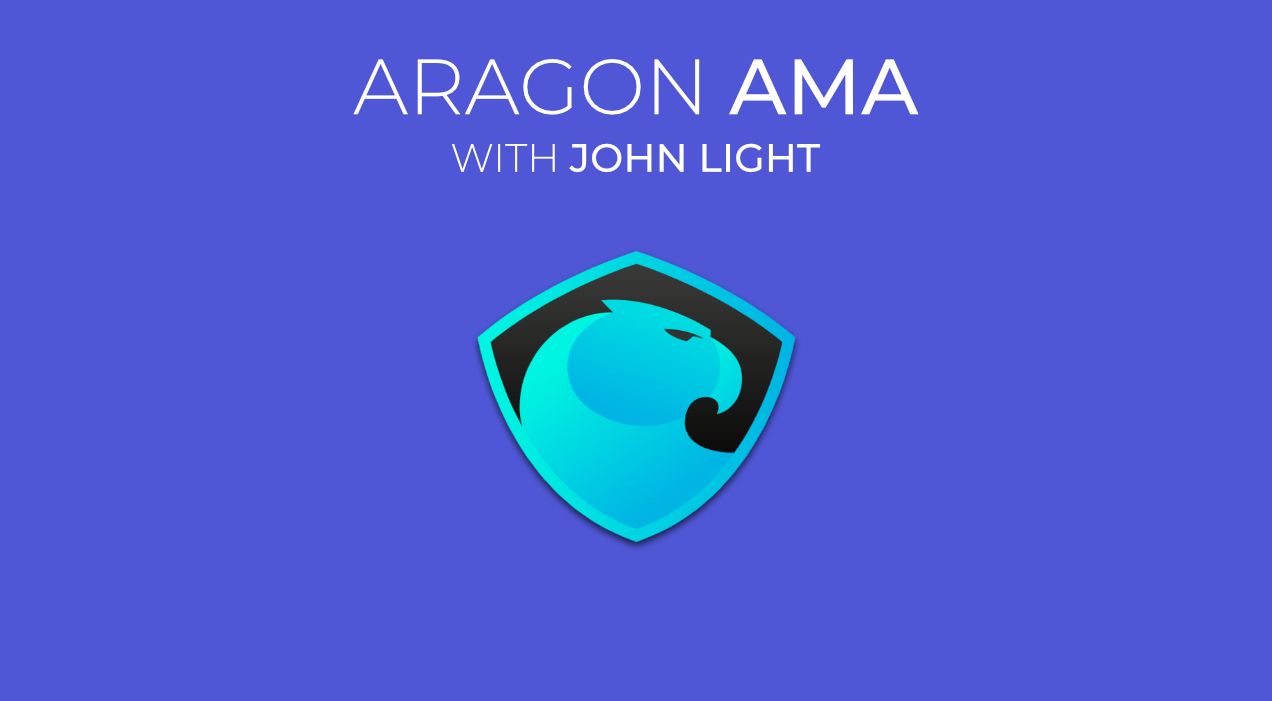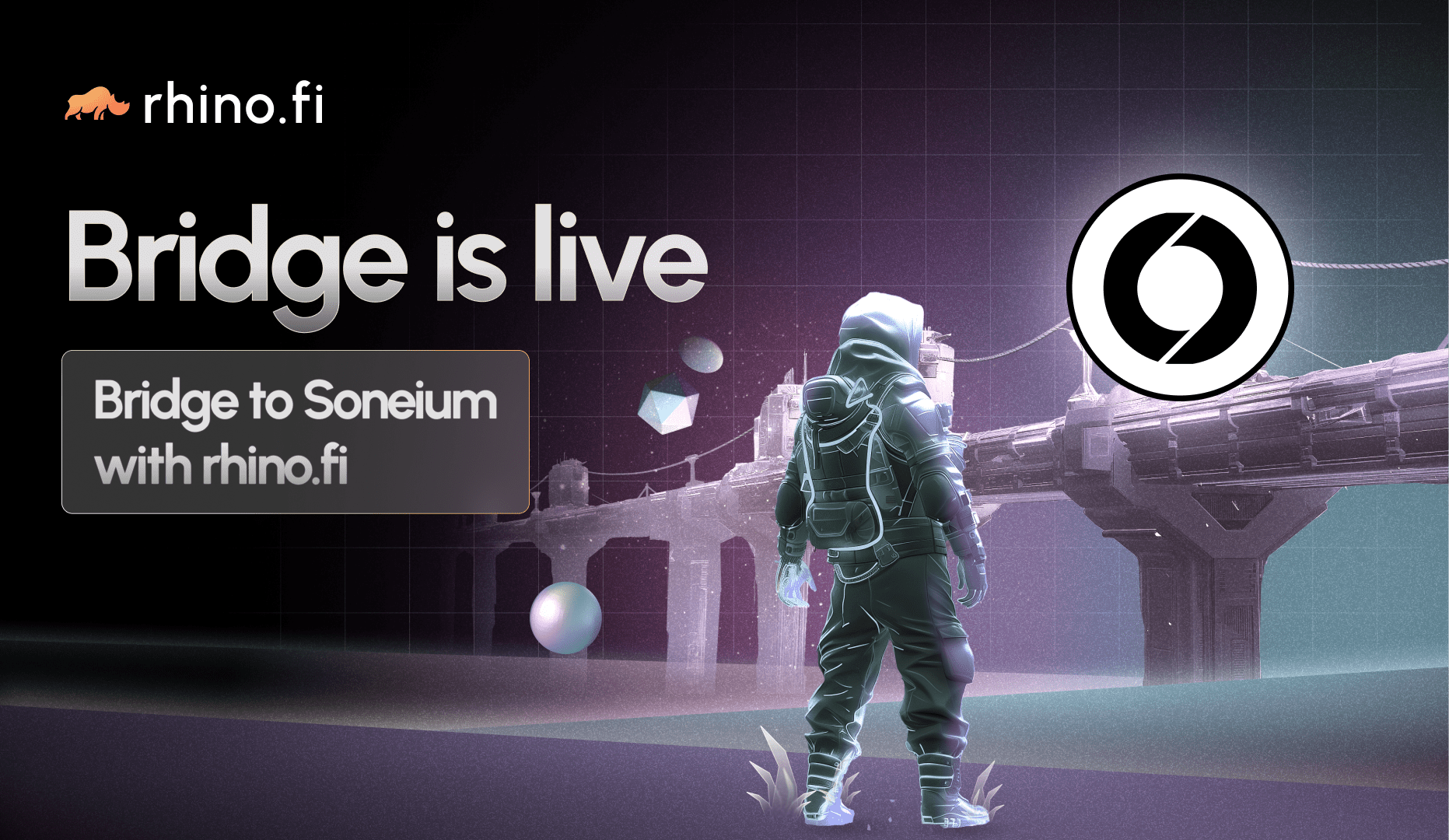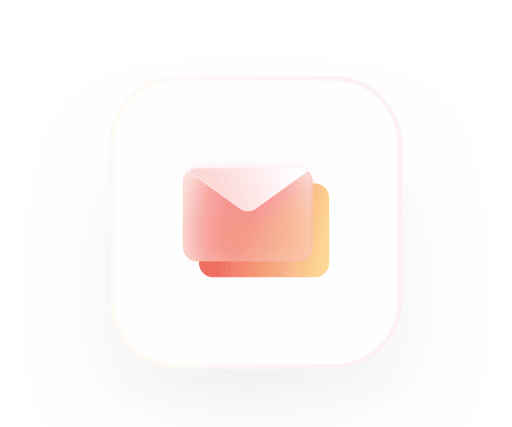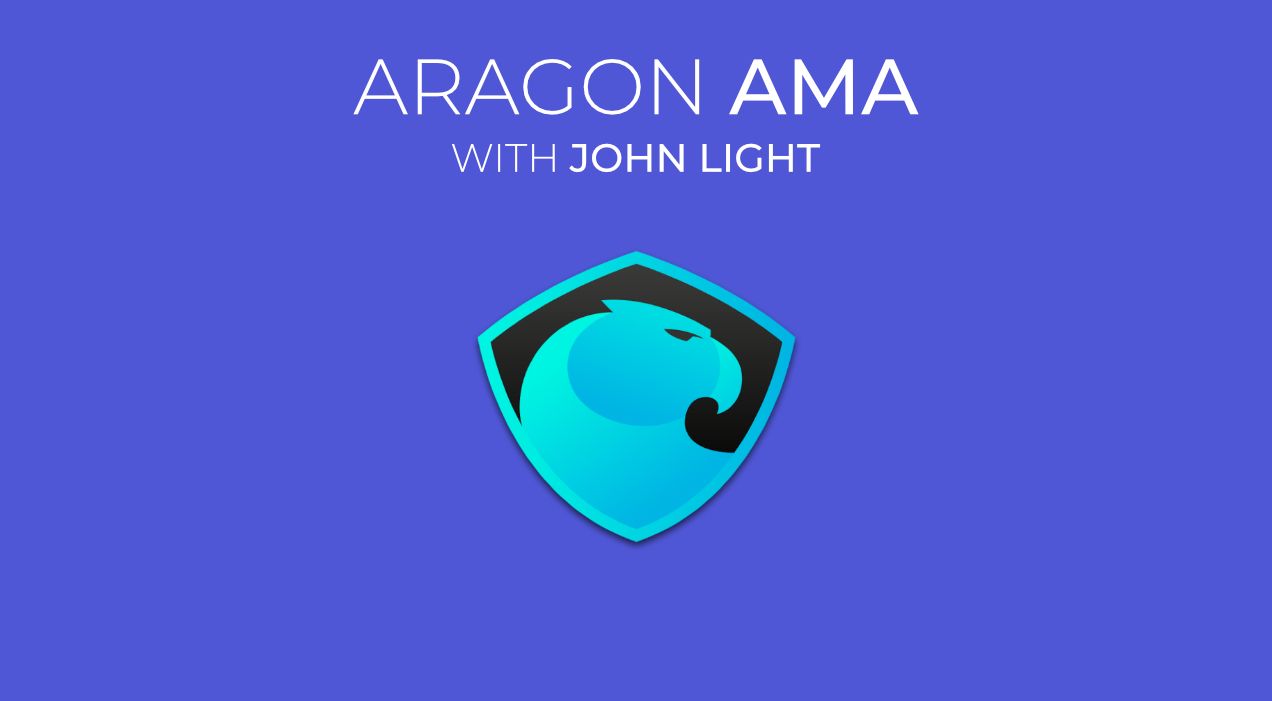

We recently welcomed the passionate team behind the Aragon Project to our Telegram for a community AMA. Check it out below:
TL;DR
- Founded with the broad goal of ‘fixing governance’.
- ANT’s primary utility in the network will be governance (both of treasury/financial decisions as well as contract upgrades) with the expectation that ANT holders will direct resources towards the development of value additive services.
- Recently conducted a successful series of votes (AGPs) on which ANT were used as a voting mechanism.
- Aragon Network Votes happen quarterly, and the deciding factor is whether ANT holders approve them or not.
- Thousands of organizations have thus far been created on testnet and there are over 300 organizations on mainnet today. With the Melon project recently starting to use Aragon for its governance.
- Concierge is the Aragon programme that allows for a greater level of customisation for those businesses looking for more bespoke functionality. Recent real-world examples being Melon and DappNode.
Dive in…
Joyce admin: Please all join me in welcoming John Light(@john_light ) to our community – welcome John and thank you for taking the time to join us today.
John Light: Thank you for inviting me 😁My colleague @lkngtn who is a governance researcher at Aragon One is also here. He is working on the economics and governance mechanisms of the upcoming Aragon Network.
Joyce admin: Great! Perhaps we can kick things off with some introduction by telling us a bit about the project Aragon is working on; how you guys came to be and what key problems you are solving?
Aragon started with the broad goal of “fixing governance” and the means to do that was enabling people to build decentralized organizations – borderless, global, digital-native organizations that could take advantage of new forms of governance enabled by smart contracts
Looking around the world and through examples in history we can see that governance has been an area with lots of experimentation and a lot of failure. So there’s an interesting question to be answered which is “can we do better?” We believe we can, and that for many kinds of organizations, smart contracts could provide an answer.
The main tools we are building right now are developer tools and a frontend client that all support creating and governing organisations on Ethereum.
Our tools can be used on the Rinkeby testnet and Ethereum mainnet today. More info about these can be found at aragon.org/discover and hack.aragon.org
Our most ambitious in-development project (imo) is the Aragon Network, a digital jurisdiction for decentralized organizations. The first service provided by the network is a court system that will arbitrate disputes between organizations and individuals who opt-in to this digital jurisdiction.
Daryl: What’s the Utility of Aragon Tokens?
Luke Duncan 🐝 (Aragon): ANT’s primary utility in the network will be governance (both of treasury/financial decisions as well as contract upgrades)
The expectation is that ANT holders will direct resources towards the development of value additive services such as the arbitration protocol that we are working on and these protocols will leverage ANT in various ways. For example in the Court/Arbitration protocol to participate as a juror you would need a staking or work token, which can be acquired by depositing ANT into a bonding curve.
Daryl: Could you elaborate more on the Governance part? What are the existing roles in governance that ANT is being used in?
Luke Duncan 🐝: Currently ANT holders are involved in the projects governance through the AGP process: https://github.com/aragon/AGPs.
Also tbh first time hearing of the contract upgrades part. Does that mean to upgrade the contract is have to pay a fee of ANT?
Luke Duncan 🐝: No, ANT will be used to govern upgrades to the Aragon Network and the services (like the court) that the network deploys.
If an organization is using AragonOS for upgradeability of their organization or an application they develop, ANT would only be involved if they choose to use the court in their governance process for determining upgrades.
This I think will be quite common, especially for things like contract upgrades.
Daryl: Thanks for the clarifications 👌
Kasper: Hey John, thanks a lot for doing this 🙂 Could I ask into the role of the ANT token, and how you see that evolving over time?
Luke Duncan 🐝: https://forum.aragon.org/t/long-term-funding-of-aragon/547/2?u=lkngtn… I shared some thoughts in that forum post on how I would expect to see ANTs role evolve over time that you guys might find useful.
There are lots of potential paths that the network could take to defensibly drive either revenue for the network or demand for ANT in that post 🙂
But ultimately it will be up to ANT holders to choose which path(s) we take
Charles: Really interesting stuff, but for a tech mere-mortal like myself I find it quite confusing. Would you be able to give use case examples? Cheers
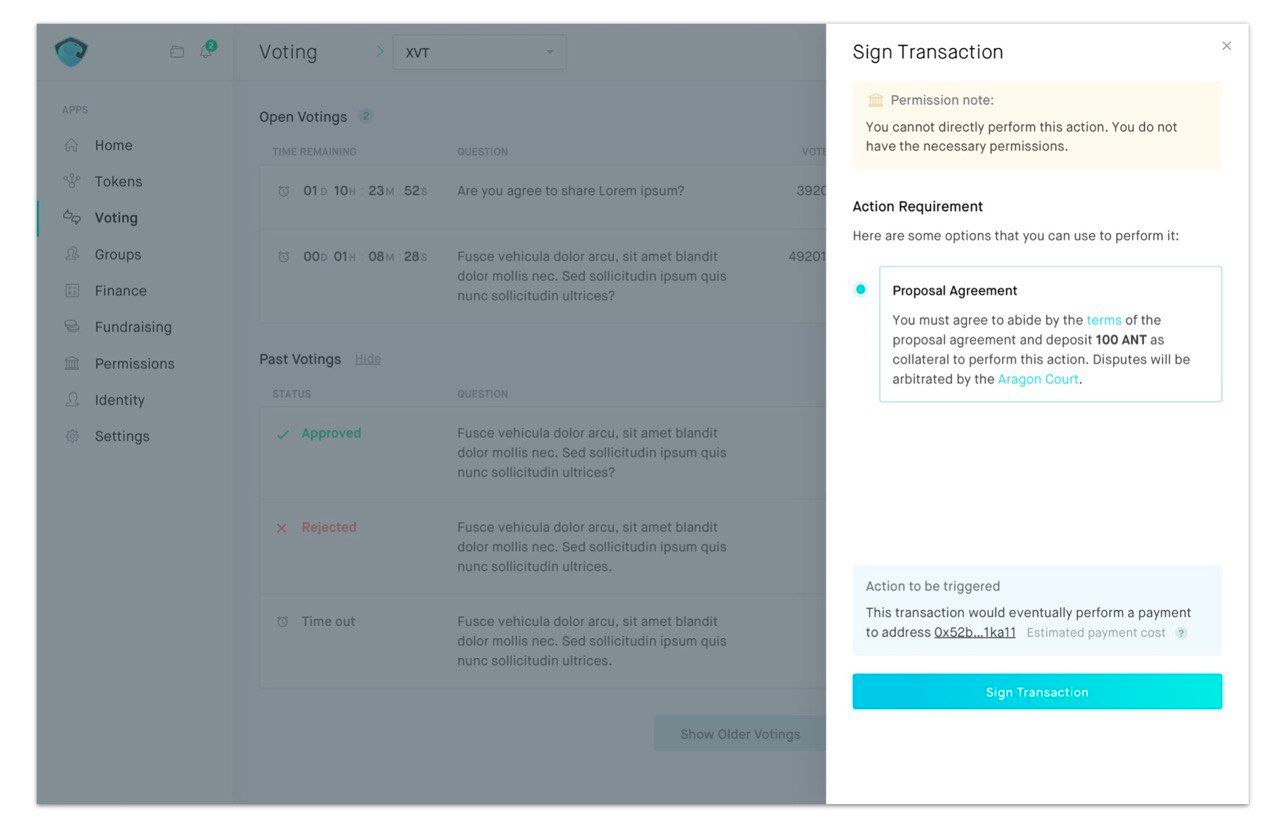

This is an example of how a user of Aragon might interact with the Aragon Network (specifically the arbitration protocol).
An action within the organization can be protected by a “proposal agreement” requiring them to deposit collateral and pay a fee to the network for providing arbitration services in the event of a dispute.
This is incredibly useful for an organization, because it allows the organization to define subjective human readable terms for the types of actions which are acceptable.
For example an organization might have a treasury that should only be used to fund software development, or might allow contract upgrades for bug fixes (but not to allow those upgrades to change permissions of the org).
Since the smart contract can’t tell the difference between those things, disputes may occur, and relying on a protocol external from the organization protects the rights of passive and minority stakeholders within the organization from malicious behaviour of majority stakeholders.
John Light: I would separate this into two parts: one is what are the use cases of decentralized organizations, the other is what is the use case for a decentralized jurisdiction and court system.
A use case for decentralized organizations would be for example an open source project that spans multiple countries, and includes people who don’t want to reveal their IRL “legal” identity. The Aragon client can give this project a way to collaboratively govern their shared resources (such as their code repository and funds raised from supporters).
If there’s a dispute in this imaginary project over how the funds are spent (for example a minority of project members think that the majority is spending the money frivolously) then they can open a dispute in the Aragon Network court. Jurors in the court can then look at the evidence and decide if the majority is acting in good faith or not, and prevent abuses of power.
Charles: Ah I see! Thanks for the explain, that’s really cool. Has there been much interest so far?
John Light: There has, thousands of organizations have been created on testnet and there are over 300 organizations on mainnet today. The Melon project recently started using Aragon for its governance. Aragon Network Votes happen quarterly, and the deciding factor is whether ANT holders approve them or not. There are four “tracks” that a proposal can be submitted to: the Association track (governing Aragon Association policy), the Finance track (governing funds held by the Aragon Association), the Meta track (governing how the governance process itself evolves), and the Proclamations track (collective statements made by ANT holders)
Meta track proposals require >66.66…6% support
All other tracks require >50% support and there is no min. quorum requirement right now.
I talk more about the history of Aragon Network governance, how it works today, and how it could change in the future in this recent talk at AraCon: https://youtu.be/k-ZoXV6D4H4?t=11531
Joyce: Thank you for sharing the video. One last question before we wrap up the AMA. What exciting partnerships have you got in the pipeline?
John Light: None! We don’t do partnerships the way a traditional company would. We operate more like an open source project, where individuals and organizations can choose to adopt the software or not. That said, Aragon One does collaborate with other organizations to either build software, create new standards, or help them adopt the software through what we call a “concierge” service, which is informal right now but may be formalised in the future
@izqui might be able to talk a bit about concierge…
…
Jorge (Aragon): Hey! Concierge is a program that Aragon One has been pushing pretty ad-hoc for now. We basically work with projects that want to use Aragon, but to whom the out of the box Aragon experience is not enough. We help them create deployment scripts for their custom governance models (like Melon) or assist them in creating the Aragon app they need (like we did with DAppNode and their NFT issuance app)
Admin: Awesome. 🙂 Thanks again for stopping by and providing that info @john_light, @lkngtn and @izqui
John Light: Yes thanks again for having us! If y’all or anyone else here has a need for tools to help with decentralized governance please let us know. We have a welcoming community at https://aragon.chat and https://forum.aragon.org if you have any questions or feedback about what we’re working on. ✌️
Subscribe to our newsletter here.
Start trading on Ethfinex or Ethfinex Trustless.
Stay up to date with Ethfinex on Twitter, Telegram, Linkedin, Facebook and Youtube.
